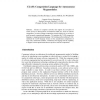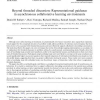649 search results - page 27 / 130 » Focusing in Asynchronous Games |
COORDINATION
1999
Springer
14 years 1 months ago
1999
Springer
Advances in computer networks that support the invocation of remote services in heterogeneous environments enable new levels of software composition. In order to manage composition...
POPL
2009
ACM
14 years 9 months ago
2009
ACM
Asynchronous or "event-driven" programming is a popular technique to efficiently and flexibly manage concurrent interactions. In these programs, the programmer can post ...
CE
2008
13 years 9 months ago
2008
Although most online learning environments are predominately text based, researchers have argued that representational support for the conceptual structure of a problem would addr...
DIGRA
2005
Springer
14 years 2 months ago
2005
Springer
Espen Aarseth recently claimed that all games referred to as ’narrative games’ could better be described as ’quest games’. The writer of this paper suggests that Max Payne...
DIGRA
2005
Springer
14 years 2 months ago
2005
Springer
Game studies methodologies which focus on the visual, narrative, and semiotic content of digital games overlook the way that embodied perception and physiological response contrib...


